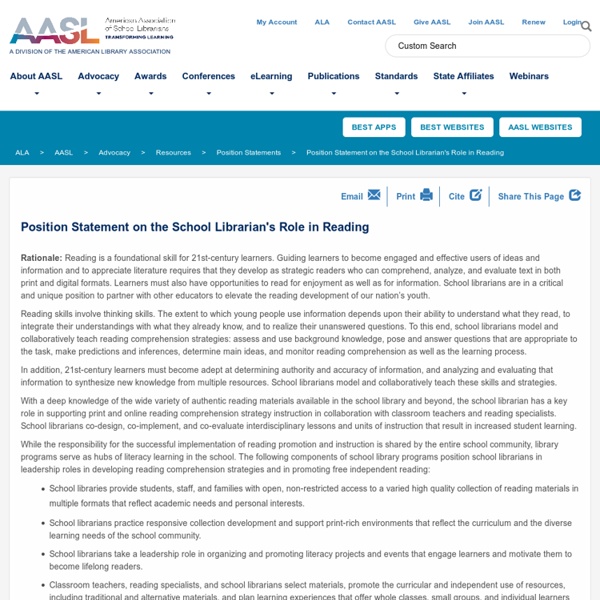Position Statement on the Value of Independent Reading in the School Library Program
The following position statement is currently under review to align with the National School Library Standards. In an information age, literacy demands not only the ability to read and write, but also the ability to process information and communicate effectively. Research suggests that reading proficiency increases with the amount of time spent reading voluntarily. Unfortunately, independent reading is often a casualty in our fast paced, media-oriented society.
Fountas and Pinnell Say Librarians Should Guide Readers by Interest, Not Level
Our recent article on reading levels and the dangers of using strictly prescribed leveling systems in libraries for young readers sparked much dialogue and debate. One of the most popular and widely used reading systems is the “A to Z” gradient, developed by Irene C. Fountas, professor in the School of Education at Lesley University in Cambridge, MA, and Gay Su Pinnell, professor in the School of Teaching and Learning at Ohio State University.
Position Statement on Labeling Books with Reading Levels
The following position statement is currently under review to align with the National School Library Standards. Librarians use spine labels to organize and identify library resources by call number to help patrons locate general subject areas or specific fiction, non-fiction, reference, audiovisual, or other items. Viewpoint-neutral directional labeling in libraries increases students’ access to information and supports their First Amendment right to read. Best practice in school libraries includes books and other resources being shelved using a standard classification system that also enables students to find resources in other libraries, such as a public library, from which they may borrow materials.
Heart of the School
Share17 Have a look at some of these reports, all of which stress the importance of reading for pleasure and educational achievement. A well run and professional school library can address these difficulties. (Most recent reports first.) Book ownership, literacy engagement and mental wellbeing National Literacy Trust 2018
Readicide
Read-i-cide n: The systematic killing of the love of reading, often exacerbated by the inane, mind-numbing practices found in schools. Reading is dying in our schools. Educators are familiar with many of the factors that have contributed to the decline—poverty, second-language issues, and the ever-expanding choices of electronic entertainment. In this provocative new book, Kelly Gallagher suggests, however, that it is time to recognize a new and significant contributor to the death of ...read more Reading is dying in our schools.
Organizing Booktalks
Reader’s Advisory can take many forms, but my favorite is booktalking. The beginning of a new semester is the perfect opportunity to reach out to teachers and offer to do booktalks for their classes. Last week, I gave booktalks for twelve classes.
Thinking Outside the Bin: Why labeling books by reading level disempowers young readers
Illustration by James Steinberg A child enters the library, looking for something to read. She wanders the aisles, glancing at book spines, running her finger along the shelf, and lingering at a display of new titles. “Can I help you?” asks the librarian, following with more questions about her tastes: What was the last book you read?
School Librarian's Role in Reading Toolkit
Skip to main content School Librarian's Role in Reading Toolkit Excerpt from the School Librarian's Role in Reading Position Statement Reading is a foundational skill for 21st-century learners.
Trelease Brochures on Reading
"Do you have a free handout about reading that we can give to parents?" o many teachers and administrators asked Jim Trelease that question, one of his first retirement projects was to create a series of such free handouts. Based on his books, lectures, and films, the tri-fold double-sided brochures are aimed at parents, teachers, librarians—even future teachers and parents.
Readicide: How Schools Are Killing Reading and What You Can Do About It Summary
In his introduction, Kelly Gallagher proposes a new word to be added to the Merriam-Webster dictionary: “readicide.” A noun, “readicide” can be defined as “the systematic killing of the love of reading, often exacerbated by the inane, mind-numbing practices found in schools.” He goes on to explain that Readicide is inspired from his twenty-two years of experience as a teacher and a literacy consultant. His central thesis is that “rather than helping students, many of the reading practices found in today’s classrooms are actually contributing to the death of reading. In an earnest attempt to encourage reading, teachers and administrators push practices that kill many students’ last chance to develop into lifelong readers.” Gallagher is deeply critical of standardized testing and the teaching strategies they have popularized, and he provides readers with ways to end readicide.



